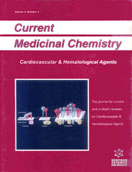Abstract
The glycoprotein (GP) IIb / IIIa (αIibβ3) found on platelets binds fibrinogen when platelets are activated, thereby mediating the platelet aggregation process. Blockading of αIIbβ3 has been proposed to prevent platelet aggregation independent of the substance(s) responsible for activating the platelets. This inhibition of platelet aggregation is thought to be an effective therapeutic approach to various thromboembolic syndromes. The development of various forms of αIIbβ3 inhibitors has resulted in the inhibition of platelet aggregation, although studies of αIIbβ3 receptor function and various αIIbβ3 inhibitors have demonstrated the potential for these agents to produce effects on other aspects of platelet function as well as having non-platelet effects. This review describes the newly derived peptides from 1) glycoprotein IIb (αIIβ) that interferes with platelet aggregation by inhibiting the binding of fibrinogen to αIIbβ3 and from 2) GP IIIa (β3) by blocking the αIIbβ3 complex formation. These peptides may become effective agents to block the interaction of ADP, type I collagen, and type III collagen (type I collagen and type III collagen are present in abundant amounts in blood vessel walls) with platelets.
Keywords: collagen, platelet, platelet aggregation, glycoprotein, and platelet aggregation inhibitor
 4
4













